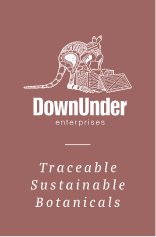Down Under Enterprises grows, produces, exports, and markets traceable
and sustainable native Australian essential oils and botanicals grown on our farm, Buhlambar, and from small growers across Australia producing unique essential oils and botanicals from plants native to Australia.
G’day mate,
Big things are happening in the US with Sandalwood which could cause headaches – or worse – if you don’t know your Sandalwood Oil’s full history. The US Lacey Act has been updated to manage the import of Sandalwood, Rosewood, and Cedarwood. Sandalwood is a precious commodity with, unfortunately, a too common association with illegal deforestation, business practices, and adulteration.
New updates to the Lacey Act take effect October 1st, 2021. These new regulations hold the importer liable for observing all laws in the supply chain of the product, local, as well as all foreign laws. This is positive news for the environment, and for Australian Sandalwood. This will level the playing field and hopefully weed out the unscrupulous traders! Down Under Enterprises has worked for many years to make sure our Sandalwood Oil – Australian (Spicatum), Album, and Certified Organic – is pure, legal, and traceable.
In this month’s newsletter:
- Over 80% of the world’s legally harvested Sandalwood is grown in Australia
- Sandalwood – beyond the fragrance webinar
- US Lacey Act – is your Sandalwood supply safe?
- Our farm: Lavender Tea Tree in Full Bloom!
Thanks for reading.

Phil Prather
FEATURED PRODUCT
Did you know that over 80% of the world’s legally harvested Sandalwood is grown in Australia?
The aroma of Sandalwood Oil can be found in many iconic perfumes in brands such as Yves Saint Laurent and Dolce & Gabbana. Sandalwood is a favorite with perfumers for its long-lasting scent and fixative properties.
Sandalwood trees need to mature for 20+ years of age before the whole tree is harvested. Unfortunately, the de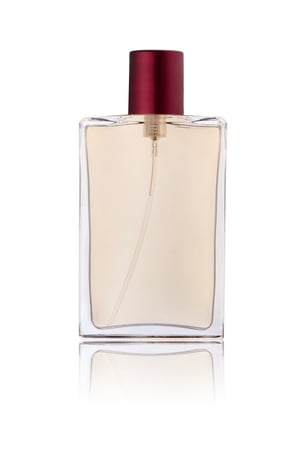 mand for this oil led to the decimation of the Indian Mysore Sandalwood forests before any regulation was enforced. While new plantings are underway in India, Australia holds the clearly dominant position as the world’s grower of Sandalwood – both S. spicatum and S. album.
mand for this oil led to the decimation of the Indian Mysore Sandalwood forests before any regulation was enforced. While new plantings are underway in India, Australia holds the clearly dominant position as the world’s grower of Sandalwood – both S. spicatum and S. album.
Researchers reporting on the fragrance industry in Molecules Journal noted that this lucrative market, and the growing demand for Essential Oils in general, has led to an increased incidence of adulteration. Adulteration of Essential Oils will not only diminish functional characteristics but, more importantly, will pose many safety concerns.
Tracing the Sandalwood Oil back to the tree is the only way to avoid corruption in the supply chain.
This current revision to the US Lacey Act is designed to counter these issues. It is a significant step towards attaining a sustainable and traceable Sandalwood supply to North America. Stringent regulations taking effect from October 1st, 2021, hold the importer liable for observing all laws and regulations (local and foreign) in the entire supply chain of the Sandalwood product being imported.
The Sandalwood (genus: Santalum) tree is native to Australia, India, and parts of Indonesia. Australia now produces over 80% of the world’s legally harvested and Sustainable Sandalwood, with larger volumes coming online to meet global demand. Australian harvesting is government-backed and has sustainability programs in place to maintain supply and protect Aboriginal heritage linked to this oil. Most importantly for Lacey Act compliance, legally produced Sandalwood in Australia is fully traceable back to the tree.
Down Under’s supply of Sandalwood is guaranteed with full traceability.
BENEFIT 1 – 100% Australian origin
BENEFIT 2 – 100% Traceable and ethically sourced
BENEFIT 3 – Sustainably grown and harvested in Australia
BENEFIT 4 – Both Santalum spicatum, Santalum album are available
THE EVIDENCE
Sandalwood – beyond the fragrance
The traceability of Down Under Enterprises’ Australian Sandalwood Oil is achieved through close cooperation with Western Australian Government-managed Forestry Products Commission (FPC) systems.
Down Under’s Founder Dee-Ann Prather joined expert speakers from the FPC and science experts on a webinar hosted by UL Prospector to discuss:
- The science and efficacy of Sandalwood Oil
- FPC managed Sandalwood activities
- “Project Woylie” Regeneration program
IN THE NEWS
US Lacey Act – is your Sandalwood supply safe?
.png?width=240&name=Manuka%20August%20(1).png)
The Lacey Act is the United States' oldest wildlife protection statute for combatting illegal trafficking of wildlife, fish, and plants. Originally enacted in 1900, the Act has undergone significant revisions over time. Since 2008 it has been unlawful to import certain plants, including plant products, without an import declaration.
- From October 1, 2021, a new phase (Phase VI) will be enforced which will require an import declaration on 27 new tariff lines, including Sandalwood Oil.
- The importer will be held liable for observing all laws in the supply chain of the product, local, as well as all foreign laws.
Down Under Enterprises (Australia) is the Exporter of Lacey Act Compliant Sandalwood from Australia and we, Down Under Enterprises (USA), are the Importer in the United States. We can confidently supply your Sandalwood Oil requirements – eliminating your risk.
Speak to us about procuring Lacey Act-compliant Sandalwood Oil. This is our area of expertise; our US based sales team are ready to help.
Learn More / Request a call
Note: Regulations may also apply to formulated products containing Sandalwood Oil imported to the US.

FARM UPDATES
Lavender Tea Tree in Full Bloom!
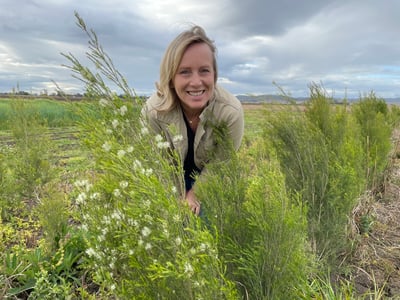
It’s springtime in Australia and our Lavender Tea Tree plants which we planted on our farm last November are already blooming!
Down Under Enterprises founder, Dee-Ann is pictured amongst the Lavender Tea Trees at our farm.
“These plantings are the newest edition to our farm. Lavender Tea Tree Oil (Melaleuca ericifolia) is also known as Rosalina. It is a melaleuca but is naturally high in linalool 45-55%. The fragrance is just magical - a soft Tea Tree aroma with hints of Lavender.” - Dee- Ann
Our farm, Buhlambar, is situated on the East Coast of Australia near the beachside town of Byron Bay, home to Thor (aka Chris Hemsworth). Buhlambar means ‘home of the Tea Tree’ in the Bundjalung language of the Aboriginal Australians native to this region.

TRACEABILITY
This Aussie family is a pioneer in distilling Sandalwood Oil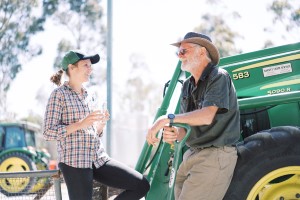
Our Premium Grade Sandalwood Oil is produced near Harvey, Western Australia, by a family-owned and operated business, established in 1997. They were the pioneers in the steam distillation of Australian Sandalwood Oil. They trialed and successfully produced the first steam distilled Australian Sandalwood Oil in 2002. At that time, other producers of Sandalwood Oil employed a process called solvent extraction, using hexane as the solvent.
Collectively, we work with the Western Australian government's Forest Products Commission (FPC) to guarantee traceability back to the tree while maintaining a sustainable Australian Sandalwood industry.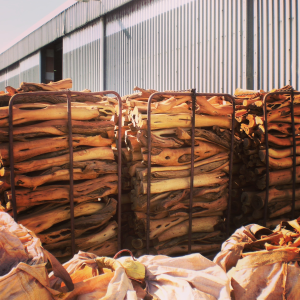
Since then, more than 700 metric tons of Australian Sandalwood have been steam distilled with Sandalwood sourced from the FPC and private Indigenous Aboriginal sources. There is a long history of Indigenous traditional use of sandalwood in the central desert of Australia.
Sustainability is also key in the operation of this farm. A novel example is the use of the water byproduct from the distillation process as a commercially available "hydrosol'. The remainder is recycled to irrigate the farm as part of a drip irrigation system. Environmentally-friendly farming practices are also employed with minimal and careful use of special herbicides and fertilizers that are generally approved for organic certification.
They have a “no tolerance” approach to the illegal harvesting of sandalwood and support the sustainable management of this beautiful natural resource as defined by the Forest Products Act 2000 and the Biodiversity Conservation Act 2016.
Learn more about our Sandalwood growers and our other Wood Oils producers on this interesting VIDEO journey around Australia.

SUSTAINABILITY
A Sustainable Model for Australian Sandalwood
The Western Australian government, through its Forestry Products Commission (FPC), has implemented what can be truly described as a sustainable approach to protecting its Sandalwood trees. Their program is a holistic one that looks deeply into its native ecosystem and indigenous peoples for guidance.
Their program respects and protects areas of Aboriginal cultural value. This includes the geographic exclusion of protected zones and the employment of Aboriginal staff to plant in environmentally and culturally sensitive areas.
A tiny marsupial called a ‘Woylie’ but also known as a desert rat-kangaroo, was identified for its critical role in the dispersion of Sandalwood seeds, which supported wild sandalwood regeneration. Unfortunately, the Woylie population was in decline due to predation by feral cats and foxes - and so ‘Operation Woylie’ was launched.
The sustainability program was created by the Western Australian Government and is enforced by the Forest Products Commission (FPC). The FPC governs the cultivation, harvesting, distillation, and supply of sandalwood from government-owned land and from private sources licensed to harvest an agreed annual quota.
Harvesters of Australian Sandalwood are licensed and required to conform in all aspects of the environmental and operational requirements as controlled by the WA Forest Products Act 2000 and the Biodiversity Conservation Act 2016 to maintain a sustainable harvesting operation.
To learn more about this program click below.
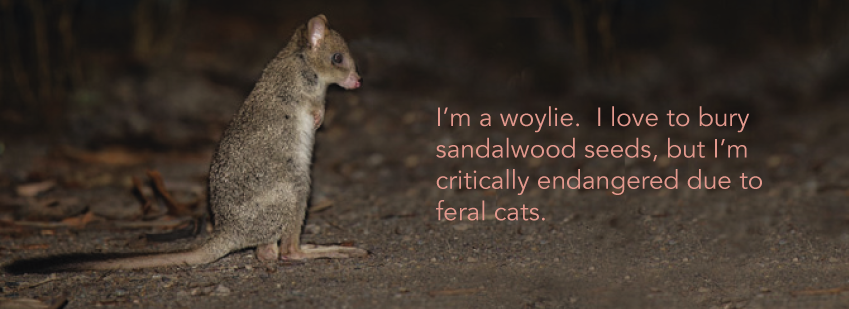

MY FAVORITE OIL
Michael talks Sandalwood
Michael, our Order Fulfilment & Inventory Manager, discusses his favorite oil and the surprising link he made to a memory of Sandalwood fragrance.
Fun Fact: Aroma has a strong link to memory recall, significantly more so than all other sensory information received by the brain.
